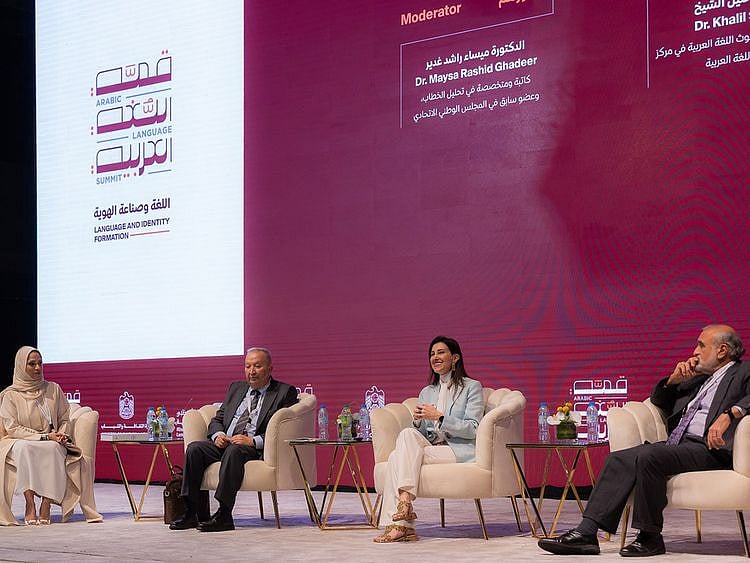Arabic Language Summit reviews status report of curricula and Arabic language teaching in UAE
Expert calls for policy fostering proficiency in Arabic and training language teachers

Abu Dhabi: The Arabic Language Summit, organised by the Ministry of Culture and Youth in cooperation with the Abu Dhabi Arabic Language Centre of the Department of Culture Abu Dhabi, reviewed ‘Curriculum Status Report’ in a special session. The session discussed the results of the case study report on Arabic language teaching in schools from primary to secondary level.
Moderated by Dr. Maisa Rashid Ghadeer, writer and discourse analysis specialist and former member of the Federal National Council, the session hosted Dr. Khalil Al Sheikh, director of the Department of Arabic Language Education and Research at the Abu Dhabi Arabic Language Centre; Dr. Hanada Taha, professor of Arabic Language at Zayed University; and Dr. Mahmoud Al Batal, professor in the Department of Arabic and Near Eastern Languages at the American University of Beirut. The speakers explored the advantages and challenges of teaching Arabic in schools in the stages covered by the report.
Pillar of cultural identity
The session discussed the results of the report to develop the education process from the point of view of specialists and experts and highlighted pioneering experiences in teaching Arabic in Arab and non-Arab regions with a view to empower the language as a pillar of the cultural identity.
In his speech, Dr. Khalil Al Sheikh stressed that reading is a window for language learning, but in the current system schools, have not succeeded in making reading a habit outside the curriculum. He pointed out the need to review the reasons for the weakness of students’ linguistic aptitude in Arabic as compared to other languages and find ways to support and develop it. He further added that the responsibility is shared between the school system and the family system, stressing that the latter comes in the first place pointing out to the need to make Arabic a language of life in the true sense of the word and not just limited to curricula and texts.
Catch them young
Dr. Hanada Taha commented on the issue of not teaching Arabic in kindergarten: “We must pay more attention to promoting the Arabic language among the new generations and finding a mother tongue for the child. We cannot deny that there is a lack of awareness about this issue, and if we really want to contribute to the growth of the Arabic language and make it a part of daily lives of our children, we must connect them to their language from the very beginning. It is time, we looked at the kindergarten stage as the most important stage in the life of a child for language learning. In kindergarten, however, English is taught as the first language, there is a need to put Arabic as the language that shapes the child’s identity.”
She stressed that the time available to teach Arabic in schools is not enough to enable students to speak during a 45-minute session: “We need an education policy that fosters proficiency in Arabic and trains teachers to be able to teach the language more effectively.”
Dr. Mahmoud Al Batal pointed out. She said that there is a problem in the curricula as it is not relevant to students, pointing out that the biggest challenge, in his opinion, is the human element, which is the teachers.
Why are the challenges?
He said: “Our teachers lack expertise and the ability to adapt the material to suit the needs of present-day students. In addition to the fact that the parents themselves are not equipped to help their children with the Arabic language. This problem is not specific to a particular country, but it is common across the Arab world.”
Al Batal pointed out that another obstacle that hampers Arabic learning is the lack of Arabic in scientific research in universities. He mentioned the need to develop strategies, and pay more attention to teaching grammar rules and training students to use the language in science and research and not limit it to just theoretical knowledge.
He said: “The biggest challenge is that despite all our new approaches, our vision for teaching Arabic grammar is outdated. We have not been able to transform grammar into a concept related to the functions and tasks that learners need today.”
Sign up for the Daily Briefing
Get the latest news and updates straight to your inbox
Network Links
GN StoreDownload our app
© Al Nisr Publishing LLC 2026. All rights reserved.